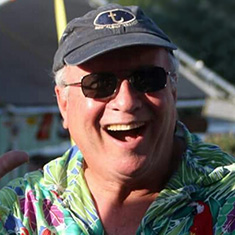Alumnus pays tribute to father by establishing Kessler Family Research Lab
Aug. 02, 2018 — The role of college is not to prepare students to get a good job or make a lot of money.
Instead, Austin Kessler ’76 sees instilling in students a lifelong love of learning, an intellectual curiosity, an appreciation for the arts, and an ability to think critically as the main purposes of a liberal arts education. Being able to write and speak clearly, and participate actively and intelligently in the community and in social and political causes are among the other benefits.
 Austin Kessler ’76
Austin Kessler ’76
“Grinnell instilled in me a lifelong love of learning, and for this, I will be eternally grateful,” Kessler says. “The lasting value of a liberal arts education is not learning a bunch of facts. It’s learning how to learn. The College changed my life by opening up a completely new world of learning.”
Kessler is now making it possible for future generations of Grinnellians to have similar life-altering experiences. The Austin, Texas, resident has committed two gifts totaling $100,000 to the College.
Kessler has pledged a $50,000 gift to fund the Kessler Family Research Lab in the new Humanities and Social Studies Center (HSSC). He also has bestowed a $50,000 gift in his estate to provide a partial need-based scholarship to one or more students.
“I have always been impressed by Grinnell’s need-blind admission policy,” Kessler says. “This has been possible because the College’s endowment fund has performed very well. But there is no guarantee that this will continue indefinitely, and I want to do my part, however modest it may be, to ensure that this policy can continue.”
The Kessler Family Research Lab, which will be on the first floor of HSSC, will serve student research endeavors in a space that honors Kessler’s recently deceased father, Edwin Kessler III. Edwin was a highly regarded meteorologist and the first director of the National Severe Storms Laboratory in Norman, Oklahoma.
“He was often referred to as the ‘father of Doppler radar’ and performed cutting-edge research on tornadoes and severe storms,” Kessler says.
After his retirement, Edwin enjoyed a second career as an activist in a variety of social and political causes, including public transportation, environmental protection, energy conservation, and campaign finance reform. Much of Austin’s own career was devoted to health care reform and health policy research. He retired in 2013 from the Texas Department of State Health Services.
“I am now retired from my day job, my house is paid for, my kids have left home, and I just signed up for Medicare,” Kessler says. “Since I am in a position to give back to the place that has given me so much and help make the Grinnell experience available to someone who otherwise would not have the opportunity, I consider it both an honor and an obligation to do so.”
Kessler originally found out about Grinnell College when a recruiter visited his high school. The description of small classes, a great student-faculty ratio, and coed dorms without fraternities and sororities caught his attention. Grinnell’s tradition of social and political activism, and the fact classes were taught by full professors further drew him to the College.
“Students work hard and take academics seriously, but they also know how to have a good time,” he says. “When I visited the College as a prospective student, I heard Grateful Dead music playing in the dorms, and saw that so many of the male students had ponytails and beards. That’s what clinched it. I knew this was the place for me.”
Kessler earned a history degree at Grinnell. He has returned to the College for most of his class reunions during the past 45 years.
“Coming back reinforced my love for Grinnell and the lifelong friends that I made while I was a student,” he says.
— by Jeremy Shapiro & Robert Ruhl '76 (Alumni Council)